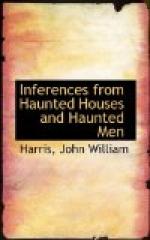The experiments reported in Mr. Podmore’s excellent book, though invaluable, are probably not exhaustive.
Colonel Meysey Thompson’s Reminiscences relate a wonderful occurrence connected with his father, but it is believed that more striking matters occurred even than this. To return to the haunted house.
The cottage to the east of the glen—Ballechin cottage—(there is no reason for not using the name except that B—— is shorter than Ballechin; indeed the public and the Perthshire police should combine to clear the neighbourhood of the gang who have troubled a charming country house)—was once a place for retreat for nuns. The fact was not known to Miss Freer and her friends until several visions of nuns had been seen in the glen.[18]
[Footnote 18: “Haunting of B—— House,” p. 136.]
The poor religious women, like the priests, must have been a favourite prey of the hypnotists.
The writer believes that the late Cardinal Manning approved of religious ladies residing with their families and carrying on works of charity, a less wretched life than the usual nun’s life often unavoidably must be. English Catholics have not been subjected to the terrors of a casa de exercitios such as broke the courage of Mrs. Grahame’s spinster friend.[19] It must have been extremely repulsive to the feelings of a man like Bishop Guerrero, and doubtless did not continue to exist long even in remote Chile.
[Footnote 19: Grahame’s “Chile.”]
But subdued in spirit as they are, the attacks of hypnotists would be terribly felt by most nuns.
Father H.’s apparition was seen by Miss Langton in a dream or vision. She recognised him when she met him three months later; he may have been shadowed by some of the hypnotists for purposes of information; and the idea that he should be begged to aid in blessing the house and banning the haunters, may have been a thought transferred by a hypnotist to Miss Freer, who is liable to thought transfer, and is a good transferrer herself. Why should not a nun’s apparition be transferred as was Father H.’s (to Miss Langton)?
It appears that valiant resistance can inflict this possession upon hypnotists as well as the horrors of a hard and disgusting victory do.
Perhaps the Scin-laeca of Bulwer’s “Harold,” the apparition of Cerdic, haunted the imaginations of generations of magicians. These were possibly Celts; only one witch-rune on a Saxon sword was found; that was in the Isle of Wight. It was, Professor Stephens said, a solitary instance, as the brave Germans thought magic the art of a coward. The hypnotism from which all the garrison suffered was a slight hypnotism; the eyes remained open and people went about behaving almost normally. Father B. lost his self-control for an instant. Some people would have to be tricked in a complicated way. Thought transfer—audible to the person affected alone, or even inaudible but perceptible like a thought—accounts




